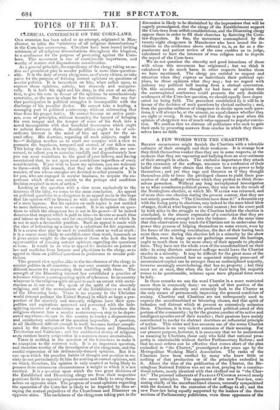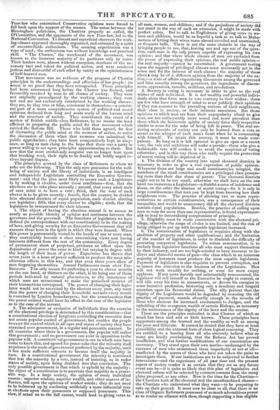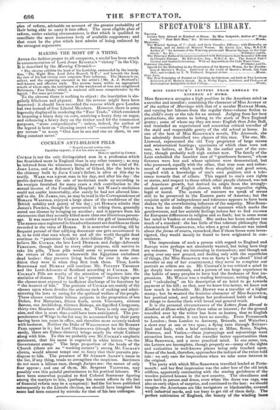A FEW WORDS WITH THE CHARTISTS.
RECENT occurrences might furnish the Chartists with a tolerable estimate of their strength and their weakness. It is strange how they think themselves weaker than they are in some respects, at the moment that they are vapouring and bullying from an over-estimate of their strength in others. The exclusive importance they attach to the extension of the suffrage, amounts to a confession of their belief that until they obtain that they can have no power to help themselves ; and yet they rage and threaten as if they thought themselves able to force the privileged classes to yield them pos- session of that suffrage without which they profess to think them- selves powerless. Without any long metaphysical investigation as to what constitutes political power, they may see in the result of the Nottingham election, at which Mr. WALTER was returned, and of more than one election during the present contest, that they are not utterly powerless. "The Chartists have done it!" a favourite cry with the losing party in elections, may indeed be the mere blind blow of anger, dealt at what happens to stand nearest ; but the court paid by both sides in the struggle to the Chartists before the election is concluded, is the sincere expression of a conviction that they are occasionally strong enough to turn the balance. At the same time that this observation may teach the Chartists not to undervalue the power they possess of helping themselves to some extent, even by the forms of the existing constitution, the fact of their having been more than once during this election left in a minority by the show of bands, even in large open-air gatherings around the hustings, ought to teach them to be more chary of their appeals to physical force. They have not the whole even of the unenfranchised on their side : in many districts universal suffrage would leave the Chartist oracles in a minority. It may be difficult for the great mass of the Chartists to understand how an organized minority possessed of accumulated capital can be stronger than an undisciplined majority, however seemingly overwhelming, that has no property ; but they must see at once, that when the fact of their being the majority comes to be questionable, reliance upon mere physical force must be folly.
In these remarks we use the word Chartist in a more restricted sense than is commonly done : we speak of that portion of the community who sincerely and earnestly look to the Charter as the only means of permanently improving the general condition of society. Chartists and Chartism are not unfrequently used to express the unenfranchised or labouring classes, and that spirit of irritation and distrust which at present so extensively animates them. Chartism, it is true, is the professed political creed of this portion of the community ; by far the greater number of its active and intelligent apostles are of their number ; their passions have mainly contributed to render its abstract doctrines an influential principle of action. This wider and less accurate use of the terms Chartist and Chartism is no very violent extension of their meaning. For our present purpose, however, it is necessary that we be understood as meaning by Chartists, those only who hold that national pros- perity is unattainable without further Parliamentary Reform ; and that no such reform can be effective that comes short of the plan embodied in "the Charter," promulgated a few years ago by the Metropolitan Working Man's Association. The ranks of the Chartists have been swelled by many who knew little or nothing of that production or of the principles embodied in it. About the time of the publication of the Charter, the Bir- mingham National Petition was set on foot, praying for a constitu- tional reform, nearly identical with that chalked out in "the Char- ter." The personal adherents of FEARGIIS O'CONNOR avowed nearly the same principles. The opponents of the new Poor-law, con- sisting chiefly of the unenfranchised classes, naturally sympathized with the demand for the extension of the suffrage to all ; and the new Poor-law being equally supported by the leaders of the three sections of Parliamentary politicians, even those opponents of the
Poor-law who entertained Conservative opinions were forced to fall back upon the support of the masses. The union between the Birmingham politicians, the Chartists properly so called, the O'Connorites, and the opponents of the new Poor-law, led to the National Convention. To distant and superficial observers the work- ing-classes appeared thoroughly organized, and animated by a spirit of uncontrollable enthusiasm. The seeming organization was a rope of sand ; the enthusiasm was without knowledge and practical skill. " The Charter," the watchword of the movement, was known to the immense majority of its partisans only by name. Their leaders were, almost without exception, destitute of the ne- cessary tact and talent for political action, and were rendered jealous and distrustful of each other by vanity or the opiniativeness of half-learned men.
That movement was no evidence of the progress of Chartist principles in the understandings and affections of her people : its arrest is no proof that they have retrograded. Those principles had been announced long before the Charter was framed, and favourably received by men in all classes of society. They were not originally promulgated by the working classes ; they were not and are not exclusively entertained by the working classes : they are, be they true or false, consistent in themselves—a consist- ent part of a more comprehensive system of political and moral opinions, deduced from long and acute study of the human mind and the structure of society. They constituted the creed of a section of British middle-class Reformers, by no means the least efficient in preparing the public mind for that movement which carried the Reform Bill. Those who held them agreed, for fear of distracting the public mind at the moment of action, to waive the discussion of them when that measure was submitted for public approbation ; they have been comparatively kept in abey- ance, so long as men clung to the hope that there was a party in power willing to act upon principles approximating to them. But now that the most credulously sanguine can no longer lean upon that breaking reed, their right to be frankly and boldly urged re- vives beyond dispute. The principles avowed by the class of Reformers to whom we refer are the following. That the only sure guarantee for the well- being of society and the liberty of individuals, is an intelligent and independent Legislature controlling the Executive Govern- ment: and that the plan most likely to secure such a Legislature is by making it elective, under these conditions—first, that the elections are to take place annually ; second, that every adult male of sane mind is to have a vote ; third, that the vote of each elector is to be given secretly ; fourth, that the country be divided into electoral districts of equal population, each district electing one legislator; fifth, that every elector be eligible ; sixth, that the legislators be remunerated for their labours.
1. The object of having the elections annual is to secure as nearly as possible identity of opinion and sentiment between the governors and the governed. The functions of legislators we have defined (in correspondence with our constitution) to be the making of laws, and giving security for an Executive Government that will execute those laws in the spirit in which they were framed. When this power is permanently vested in the hands of one or more men,
` they unavoidably become a class entertaining views and having interests different from the rest of the community. Every degree of permanence short of perpetual, produces an effect upon the depositories of power the same in kind but varying in degree with the length of their lease of power. Experience has shown that seven years is a lease of power sufficient to produce the most mis- chievous effects in this way, and that even three years allow of men forgetting themselves. Annual Parliaments mean short Par- liaments. The only reason for preferring a year to eleven months on the one hand, or thirteen on the other, is its being one of those periods indicated by natural phsenomena, to the recurrence of which men are accustomed to make the periodical reviews of their transactions correspond. The power of changing their legis- lator would not be exercised by the electors every year, any more than the power of changing their household servants every month is exercised by London housekeepers ; but the consciousness that the power existed would have its effect in the case of the legislator as in the case of the servant.
2. The admission or exclusion of individuals from the exercise of the electoral privilege is determined by this consideration—that a constitutional election of lawgivers controlling the executive does not create popular control of government, but enables the people to exert the control which in all ages and states of society they have exercised over government, in a regular and peaceable manner. In all countries where there is a government, the popular will makes that government ; and no government can exist in opposition to the popular will. A constitutienal government is one in which men have come to know this, and agreed for peace-sake that the minority shall acquiesce in the mode of government preferred by the majority, until it has made sufficient converts to become itself the majority in turn. In a constitutional government the minority is convinced that itsk the minority by a vote, instead of insisting, as in ruder states a society, upon being drubbed into that conviction. The only possible government is that which is upheld by the majority : the object of a constitution is to ascertain that majority in a peace- able way. In a large society, the opinion of every individual counts : superior wisdom, superior wealth, and other sources of in- fluence, tell upon the opinions of weaker minds; they do not need to be bolstered up by conferring artificially a more influential vote at elections upon their possessors or supposed possessors. This view, if acted on to the full extent, would lead to giving votes to
all men, women, and children; and if the prejudices of society did not stand in the way of such an extension, it might be made with perfect safety. But to talk to Englishmen of giving votes to wo- men and children, would be as hopeful a task as to talk to Maho- metans of letting their wives roam abroad unveiled and unattended, or frequent balls. There is not the same obstacle in the way of bringing people to see, that, leaving sex and age out of the ques- tion, each man is the only person capable of expressing his own opinion ; and that where whole classes of men are excluded from the power of expressing their opinions, the real public opinion— the real majority—cannot be ascertained. A government resting upon the support of privileged classes must necessarily act in the sense and for the interest of such classes : the majority of these classes may be of a different opinion from the majority of the na- tion,—a state of affairs engendering discontent among the governed and false security among the governors, the ingredients of discon- tents, oppressions, tumults, seditions, and revolutions.
3. Secrecy in voting is necessary in order to give us the real wishes of each individual. It is not wealthy and powerful indivi- duals alone that force men to vote contrary to their wishes : there are few who have strength of mind to avow publicly their opinions if they run counter to the prevailing notions of their neighbours, their class in society, or their intimate associates. But those opinions to which men are from their unpopularity afraid to give vent, are not unfrequeutly more sound and more prevalent than those which the boisterous spirits of society force their respective circles to avow for the sake of being left in peace. The real en- during sentiments of society can only be learned from a vote as secret as the whisper of each man's heart when he is communing with himself. To attain this secrecy, it must be made com- pulsory. So long as it is left optional to give an open or a secret vote, the vain and ambitious will make a parade—those who give a fashionable vote will confess it to avoid the suspicion of voting otherwise ; and in this way those who really require the protection of secret voting will be deprived of it.
4. The division of the country into equal electoral districts is necessary in order to give a real expression of public opinion.
Whenever there are large and small constituencies mingled, the members of the small constituencies are a privileged class possess- ing more than their due share of power. The electoral districts ought not to be be too small, otherwise we shall have on the one hand too numerous a Legislature—a fruitful source of indolence and abuse, on the other the absence of secret voting—for it is only in large constituencies that men can be kept from knowing how their neighbours vote. The practice of allowing two or more repre- sentatives to certain constituencies, was a consequence of their inequality, and would be unnecessary did all the electoral districts contain equal populations. Besides, the practice of calling upon men to vote for more than one representative, is found experiment- ally to lead to demoralizing compromises of principle.
5. Eligibility must be made coextensive with the electoral pri- vilege, otherwise the range of choice is too limited, and the risk of being obliged to put up with incapable legislators increased.
6. The remuneration of legislators is requisite along with the abolition of property and other qualifications ; and the limitation of the number of legislators, in order to diminish the difficulty of procuring competent legislators. To refuse remuneration, is to exclude from legislative functions all who must support themselves by their industry, and are too high-minded to have recourse to in- direct and shameful means of gain—the class which in an immense majority of instances must produce the most capable legislators.
Payment of legislators is also requisite to prevent corruption, and to insure due attention to the business of the Legislature. Men will not work steadily for nothing, or even for mere empty applause. If not more durably and substantially remunerated, the legislator will sell himself to the Executive he ought to control, or will idle away his time in amusements, or devote his energies to some lucrative profession, bestowing only a desultory and languid attention upon his Senatorial duties. The silly pretext that the dignity of the Legislature would be degraded by restoring the old practice of payment, sounds absurdly enough in the mouths of those who clamour for increased emoluments to Judges, and the upholding of the overgrown wealth of certain Bishops, as necessary to the maintenance of the dignity of the lawn and the ermine. These are the principles embodied in that Charter of which so much has been said and so little known. These principles have supporters among the learned and the wealthy as well as among the poor and illiterate. It cannot be denied that they have at least plausibility and the external form of close logical reasoning. They are entitled to a hearing from all who sincerely believe what so many are loudly proclaiming, that the Reform Act has proved insufficient, and that further modifications of our constitution are necessary. They stand upon their own merits—undamaged by the excesses of men who understood them imperfectly or not at all— unaffected by the sneers of those who have not taken the pains to investigate them. If our institutions are to be subjected to further innovations—and the experience of all past time and the present aspect of society render it as certain that they are as any future event can be—it is quite as likely that this plan of legislative and
electoral reform will be selected by common consent from the many plans proposed, as any other. Now is the time for the Chartists—
the Chartists both of the electoral and the unenfranchised classes— the Chartists who understand what they want—to be preparing to take up their ground. It must now be clear to all, that there is no class of Organic Reformers possessed of so much adventitious (sower as to render an alliance with them, though supporting a less eligible plan of reform, advisable on account of the greater probability of their being able to carry it into effect. The most eligible plan of reform, under existing circumstances, is that which is qualified to conciliate the most numerous body of available supporters; and that must be the plan which best admits of being enforced by the strongest arguments.




























 Previous page
Previous page